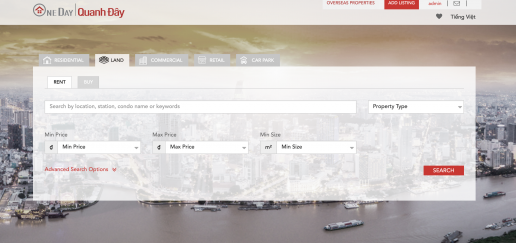Recent News
2024-09-16
OneDay Thailand (วันเดย์) Officially Launched - A brother of OneDay Vietnam More
2023-02-13
OneDay Phillipines Officially Launched More
2022-08-04
The Filmore Da Nang Apartment Project More
2022-04-08
FUSION RESORT & VILLAS DA NANG More
2022-01-04
OneDay ("Quanh Đây") Launches in Vietnam More
OneDay ("Quanh Đây") Launches in Vietnam
2022-01-04 | Author:
We are proud to announce the launch of OneDay ("Quanh Đây") in Vietnam. We are excited about the Vietnam market; it is a country that will become one of the Asian tigers in the next decade or so. Quanh Đây Vietnam (pronounced “One Day” which translates to "nearby") is a property platform that aims to connect estate agents with clients, buyers with sellers and tenants with landlords. Find out more about Quanh Đây or search for listings.
Vietnam is the next China
Many know Vietnam as a Southeast Asian country famous for its idyllic beaches, flavoursome food, Buddhist pagodas and bustling cities. But perhaps more surprisingly, Vietnam is fast becoming known for its hot real estate market.
In recent decades, China has hogged the spotlight as a county that has transitioned into the envious position of the de facto factory to the world, propelling their economy spectacularly. Quite literally, China's staggering economic growth has lifted hundreds of millions of Chinese out of poverty and resulted in a burgeoning middle class. But now with the rising costs of China’s education, labour, and real estate, all occurring as a natural consequence of their economic growth, China's low-cost competitive advantage - one of the key factors that helped get China to where it is today - is beginning to erode. So what should we make of this and where does one look for new and exciting opportunities? Cue Vietnam, a country considered to be one of the tiger economies of South-East Asia.
With its large population, stable economy, and strategic location, Vietnam offers a greater skilled workforce and cheaper alternative to China whilst being nestled in between Singapore and Hong Kong, the two major financial hubs in SouthEast Asia. Here’s why it’s worth considering owning property there, whether it’s a home or apartment to live in, some business space to lease (warehouse, office or retail space), or as your next investment.
A young and growing population
According to Youth Policy Labs, a leading global think-tank specifically focusing on youth, Vietnam is characterised as having a disciplined, hard-working, and fast-learning young population. Younger working-age populations are generally considered promising for economic development. Given the right investments, the working-age population will generate more disposable income, taxes to support a social welfare system all of which can, in turn, spur greater consumption, production and investment and ultimately accelerated growth and shared wealth.
A stable and prosperous country
Vietnam has made remarkable economic progress in the past 50 years. From the late 1970s to late 1990’s, Vietnam has successfully transitioned from a centrally planned economy to a predominantly market lead (and increasingly capitalist) economy, made possible in large part because of the economic reforms as part of the Doi Moi (open door) policy mandated in 1986. Vietnam has grand aspirations too; it’s keen to continue its comparatively fast transition from a poor nation (pre 1970) through what it’s considered now as a thriving middle-income economy into a high-income economy by 2045.
Vietnam has worked hard to establish a favourable place to do business. It has a good relationship with the United Nations, an important global organisation that lays the groundwork for investment in developing economies by promoting stability and good governance and favourable trade agreements with other member countries. Vietnam is also a member of the Association of SouthEast Asian Nations (ASEAN) and subsequently, a member of ASEAN Free Trade Area (AFTA). Additionally, Vietnam’s bilateral trade agreement with the United States, which was ratified in 2001, has benefited both Vietnamese and foreign companies exporting to the US market.
Strategically great location
Not only does Vietnam share a 1,297km border with China, but its large coastline and direct access to the Gulf of Thailand and the South China sea makes Vietnam well placed in between the two major asian trading hubs (Singapore and Hong Kong) and close to important shipping routes for exports and imports. Economic corridors such as these are conducive to attracting investment and economic activity; they provide more efficient transportation systems and lower distribution costs which leads to increased competitiveness. As a result, more industrial sectors appear, business opportunities grow, and the compounding effect is an increasing demand for housing, infrastructure, and business services, all of which pave the way for higher-quality real estate.

